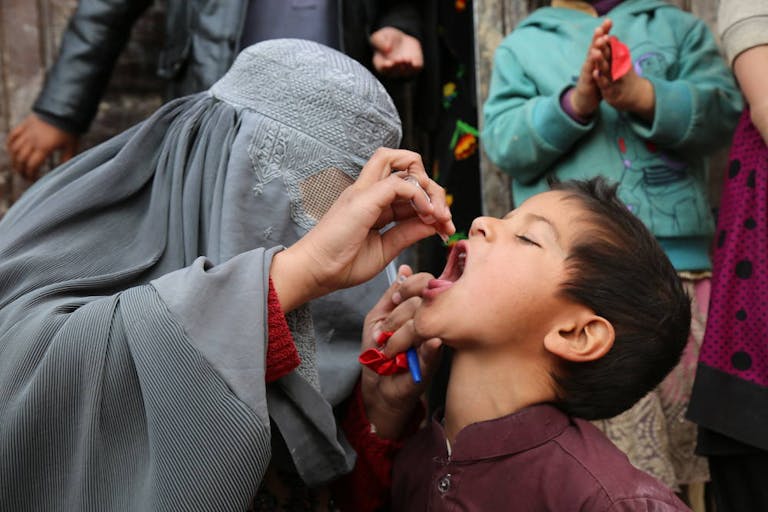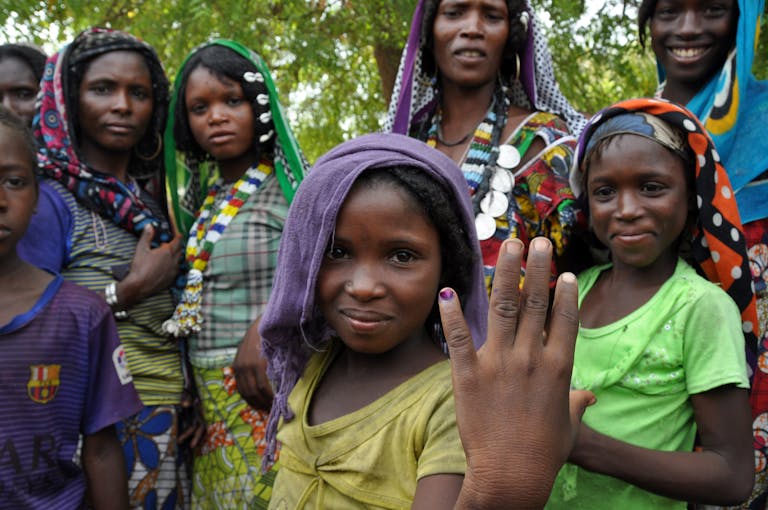Last updated March 28, 2023
Written by: Sarah Chaffee, United Nations Foundation
Earlier this month, coinciding with International Women’s Day, the 67th session of the Commission on the Status of Women (CSW) took place at the United Nations Headquarters in New York. Member States, UN agencies, and civil society representatives from all over the world came together to discuss opportunities and obstacles related to gender equality and to acknowledge the important role of women in achieving the Sustainable Development Goals (SDG). Progress on SDG 3 (good health and wellbeing) and SDG 5 (gender equality) are particularly linked as women make up 70% of the health workforce globally.
During this year’s CSW discussions, the important linkage between immunization rates and gender equality was raised. Routine childhood immunization coverage has dropped to its lowest rate in 30 years, with roughly 25 million children missing out on life-saving vaccines. Disruptions caused by the COVID-19 pandemic, humanitarian crises, and misinformation have greatly contributed to this global backslide, alongside deep-rooted gender inequalities, putting children at risk for preventable diseases such as polio and measles. Not only are our children’s lives at risk, but this massive dent in immunization coverage continues to fuel dangerous outbreaks, including in places where many vaccine-preventable diseases were previously eliminated.
Programs like the GPEI recognize that a gender lens is key. The GPEI’s 2022-2026 Gender Equality Strategy aims to integrate gender perspective into all aspects of the program’s interventions and management structures; address gender-related barriers to vaccination; increase women’s meaningful participation and decision-making at all levels; utilize gender-sensitive indicators to ensure girls and boys are reached equally; and create gender-equitable institutional environments.
As UNICEF’s Dr. Alinane Kamlongera, head of the GPEI’s Gender Mainstreaming Group, puts it, “Gender dynamics impact polio eradication efforts in multiple ways. From participation in the delivery of immunization, to whether boys and girls have equal access to vaccination, to decision-making power within households and communities on whether children are vaccinated, to the safety and needs of women on the frontlines of service delivery. Women play many critical roles in immunization programming (not limited to front-line vaccinators), and in the case of polio eradication, often in areas that are experiencing conflict and that have some of the hardest-to-reach communities.”
In some countries boys are less likely to receive vaccination services. In other countries, it is girls who lack access. Applying a gender lens to programming helps ensure that all children are reached with life-saving health services. Women are often the primary caregivers for sick children. Their access to education and health care, as well as gendered dynamics within households, impact the ability of women to seek immunization services for their children. In many contexts, female health workers are the only ones permitted to enter homes for house-to-house vaccination campaigns, and it is often more acceptable for women to provide certain types of health information to other women. In addition to serving as front-line vaccinators, women play many other important roles in immunization programming, including as managers, subject matter experts, laboratory specialists, and policymakers.

Ensuring health care for all requires health workers (women and men) to risk their lives while working in hard-to-reach communities, often in areas that are entrenched with conflict and violence. At times they are obligated to work in high-risk transmission zones to deliver care to the sickest, most vulnerable community members. Women are considered the backbone of global immunization efforts because of their strength in supporting their community. Despite their risk-taking and diligent work ethic, women continue to face gender pay gaps in the health and care sector.
The Pakistan Polio Programme has undertaken efforts to hear directly from women working on the frontlines, including what solutions they feel will address their challenges and their perspective on how the program can function safely and most efficiently. Dr. Shahzad Baig, Coordinator of the National Emergency Operations Centre in Islamabad, said of the project, “This is a very special project – and a very insightful one too. It offers us the opportunity to gain from the wealth of knowledge of the polio program’s frontline staff…the people who actually do the work of delivering the vaccine to a child have been systematically asked how they think it should be done.”
Gender inequalities create tremendous obstacles in providing equal access to life-saving vaccines, and there still remains a lot of work to be done to achieve global gender equality. Moreover, it is important to reflect on the fundamental role women play in advancing global health goals, like childhood immunization and promoting health security. Recognizing the role of women in childhood immunization and polio eradication efforts, can help ensure no child dies from a preventable disease. Prioritizing gender equality can help ensure a healthy future for our children and communities and make vaccinations that save the lives of 2 to 3 million children each year more accessible to all.

Sarah Chaffee is a Global Health Communications Intern at the UN Foundation. Sarah assists with global health advocacy and the production of the global health newsletter. She has a background in nursing and journalism and is currently working on completing her master’s in international relations and diplomacy.
To get the latest Global Health news from our experts, subscribe to our monthly newsletter.